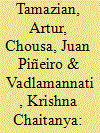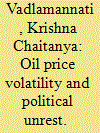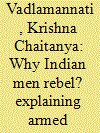|
|
|
Sort Order |
|
|
|
Items / Page
|
|
|
|
|
|
|
| Srl | Item |
| 1 |
ID:
134451


|
|
|
|
|
| Summary/Abstract |
Structural adjustment programs of the International Monetary Fund (IMF) are often blamed for disrupting social relations by forcing austerity on vulnerable people and introducing unpopular liberalization policies. Some suggest that such interventions harm ethnic relations in developing countries because they are insensitive to the tenuous social bargains that often preserve ethnic peace. Moreover, during crises, dominant groups may seek to displace the pain of reform on others, the ethnic division of labour may be affected differentially by reform policies, and ethnic entrepreneurs could use moments of crisis to their advantage. We test the propositions by using unique data measuring the level of ethnic tensions in a country. The results show that IMF interventions reduce conditions of ethnic enmity. These results are robust to fixed effects estimation, endogeneity and selection effects. Moreover, IMF interventions lower ethnic tension in countries that are highly fractionalized, but they are more problematic where larger groups face each other and when larger groups are excluded from state power. These results suggest too that IMF interventions may lead to greater empowerment of excluded groups who might agitate for change during periods of economic crisis. On balance, IMF interventions, relative to continued economic woe, pacify ethnic relations in crisis-ridden countries. We find no evidence to suggest that IMF programs increase ethnic tensions, which is good news for poor countries requiring cheap loans and assistance with reforms.
|
|
|
|
|
|
|
|
|
|
|
|
|
|
|
|
| 2 |
ID:
148033


|
|
|
|
|
| Summary/Abstract |
Some argue that the right kinds of institutions mitigate, or even prevent, the development of “natural resource curses.” Rulers with access to resource wealth, however, are unlikely to adopt such institutions, because doing so would undermine their discretionary power. We examine this proposition by testing whether countries with access to natural resource wealth prove less likely to adopt transparency-promoting Freedom of Information (FOI) laws. Using panel data on 139 countries between 1980 and 2012 (33 years), we find that, after accounting for current levels of democracy and the quality of institutions, countries deriving rents from natural resource are, indeed, less likely to adopt FOI laws. We also find that oil, but not other kinds of resources, is robustly related to a lower probability of adopting FOI laws. However, in countries with strong democracy and high institutional quality, higher income from resources is positively associated with the chance of adopting FOI laws. This suggests that rulers of countries with high resource wealth need to face high political constraints already before they adopt institutional changes. It follows that global policy aimed at increasing transparency within resource-wealthy states should focus efforts on strengthening democracy in ways that increase political competition.
|
|
|
|
|
|
|
|
|
|
|
|
|
|
|
|
| 3 |
ID:
088049


|
|
|
|
|
| Publication |
2009.
|
| Summary/Abstract |
A vast number of studies addressed the environmental degradation and economic development but not financial development. Moreover, as argued by Stern [2004. The rise and fall of the environmental Kuznets curve. World Development 32, 1419-1439] they present important econometric weaknesses. Using standard reduced-form modeling approach and controlling for country-specific unobserved heterogeneity, we investigate the linkage between not only economic development and environmental quality but also the financial development. Panel data over period 1992-2004 is used. We find that both economic and financial development are determinants of the environmental quality in BRIC economies. We show that higher degree of economic and financial development decreases the environmental degradation. Our analysis suggests that financial liberalization and openness are essential factors for the CO2 reduction. The adoption of policies directed to financial openness and liberalization to attract higher levels of R&D-related foreign direct investment might reduce the environmental degradation in countries under consideration. In addition, the robustness check trough the inclusion of US and Japan does not alter our main findings.
|
|
|
|
|
|
|
|
|
|
|
|
|
|
|
|
| 4 |
ID:
174992


|
|
|
|
|
| Summary/Abstract |
Revenue from oil makes countries susceptible to the “resource curse” since rulers have ready access to finance for buying off opposition rather than reform. We explore this issue by examining whether oil price volatility affects anti-government unrest. We argue that in oil-producing countries, low price years generate anti-government protest conditional on a state's access to foreign exchange reserves. The prudent management of oil revenue during boom years can allow some oil-rich states to manage political dissent while others fail. Contrarily, in oil-importing countries, high oil price years increase anti-government dissent, but again, conditional on access to foreign exchange reserves, which allow governments to ease the pain of austerity. Using panel data covering 165 countries between 1980 and 2013 (34 years), we find clear evidence in support of these propositions. Oil-producer countries that are able to resist political Dutch disease and save for “rainy days” are more capable of weathering low-price years. Similarly, oil import-dependent states face higher dissent during high oil price years, but conditional on access to foreign reserves. These results are in line with others that show that some oil producers avoid civil war through heavy public spending. Oil-rich countries should manage oil revenues in ways that allow them to survive the low price years, perhaps by avoiding both economic and political Dutch disease, which will only lead to inevitable regime challenge. The results are robust to alternative data, measurement, sample size, and estimation methods.
|
|
|
|
|
|
|
|
|
|
|
|
|
|
|
|
| 5 |
ID:
107655


|
|
|
|
|
| Publication |
2011.
|
| Summary/Abstract |
Armed conflicts have been a permanent feature of the northeastern region since Indian independence. Surprisingly, relentless conflicts in this remote region of India have received little attention in the literature. Although some studies on conflicts in India have made important contributions to understanding and analyzing the causes of conflicts in general, none of them has paid specific attention to the ongoing conflicts in the northeastern region of India. Relative deprivation and persistent economic and political discrimination are often identified as the major causes for armed rebellion in this region. I provide a first quantitative test of this argument, exploring whether deprivation and continual economic and political discrimination explain the probability of armed conflict incidence across nine northeastern states of India during the period 1970-2007. The main findings from probit estimations show that poverty (relative to the rest of the country) and economic and political discrimination explain conflict outbreaks, after controlling for income, population pressures, state capacity, ethnic affiliations, forest area, peace years, neighboring conflict incidence, and distance to New Delhi. The study also reports considerable support for the baseline results when controlling for potential reverse feedback effects using the generalized method of moments. These results are robust to alternative estimation techniques and sample size.
|
|
|
|
|
|
|
|
|
|
|
|
|
|
|
|
|
|
|
|
|